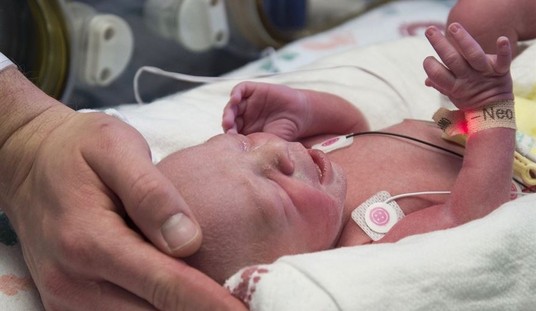This week, Glenn Reynolds asked: “Should mothers blog about their kids?” He linked to an article by Susannah Breslin about Dooce, the “mommy blogger” to the stars who writes about her children:
Apparently, readers had been wondering where Leta had been lately, as Armstrong hasn’t been writing about her much. “One, she expressed displeasure at having her picture taken several months ago, and now she actually runs out of the room when I break out a camera,” she reveals. “Two, I didn’t expect our relationship to become so complicated so early in her life.” She continues, “In fact, I thought that some of what is going on in our house wasn’t going to happen for another ten years.” She doesn’t say exactly what that is, but when she goes on to write, “For the last several months if I have mentioned Leta here I have most likely asked her if I could do so, even if it has been something totally innocuous.” It makes one wonder if what Leta is having a hard time with is the fact that her mother made her life public — without her permission. [emphasis added]
So should mothers blog about their kids? When I first started blogging over five years ago now, my kids were young and I was pregnant with my youngest. Staying home, the monotony and isolation got to me. I ain’t exactly super domestic. My restless mind sought stimulation, learning, and — later to be discovered — community. I had always worked, but with a special needs child and another kid on the way, I “made” work for myself. I heard about blogging and decided to start.
I began writing business stuff to try to help build our chiropractic practice and my part-time consulting business. That lasted all of five minutes.
I found Instapundit and followed his links. I found TTLB (if you don’t know what that is, you’re a young blogger). I started reading The Anchoress, Jeff Goldstein of Protein Wisdom (and commenting there, too), James Lileks, Betsy’s Page, Gateway Pundit, Michelle Malkin, Ace, Ann Althouse, Iowahawk, Rachel Lucas, and many more to a lesser extent. My blogroll really is representative of who was important to me in the blogosphere. I was humbled before these great minds. Terrified, really. Such intelligence and insight. And I loved politics.
There were girls like me online! They didn’t talk about diapers, and food, and pant size, and other women — except in the other woman’s capacity as a thinker. I blogged to get a break from the mommy role. And it was affirming to see other women interacted with for their ideas about the world, while being mothers and having other careers to boot.
After months of reading Elizabeth Scalia, aka The Anchoress, I mustered the gumption to ask her to blogroll me. I sent the email, abashed, and waited, mortified, for her response. To my (and later, as she told me, to her) surprise, she said yes. It was like making a good shot in golf. I was hooked.
When I first started blogging, I wrote about whatever rattled around my head, and that occasionally meant family. But as my blogging grew in prominence, the weirdness grew as well. I received death threats. And in real life, a stalker (related to our chiropractic practice) started hounding our family — something that lasted for over three years. It was scary. And a couple other bloggers dealt with stalkers, too. Michelle Malkin was threatened and had to move.
Oh hell no. Now, I’m no weakling. And the personal threats were one thing, but my family? No. So I have kept my kids and life relatively anonymous. It’s one thing that I’ve signed up for this sometimes insane milieu. My kids, however, have not.
That leads me to the other big point: consent. There are many ways a parent runs a child’s life. His food, his clothes, what he hears, sees, reads, learns, believes — these are all aspects of his life controlled by his parents. And when he gets older, he can choose more of what he wants. With enough time and maturity, he makes all these decisions for himself.
Even though I rarely blog about my kids, my daughter has said: “Mommm, don’t tweet that!” Or at times, she’s said: “Tweet that, it’s funny.” Since I will live-tweet American Idol while we’re in front of the tube together, she’ll give me input. And sometimes, her consent.
But still, no child can quite comprehend 15,000 people being notified about an opinion, or the many more thousands when something is retweeted, or the possibly tens of thousands reading a blog post or reading an article. And this, in my opinion, is the problem with children as blog material, or as actors, musicians, etc.
Children cannot comprehend time, space, and vast numbers — in context. That is, they know the feeling of a long time or “a lot,” but what does that mean, exactly? Until a person can understand these principles, using a child as fodder for a blog post, or a YouTube video (I’m thinking of the young girl who gave her opinion about abortion), or as an actor is having them sign onto something they don’t quite grasp.
A child cannot sign a contract before the age of 18 for a reason. For a very good reason. A child, savvy as he may be, hasn’t had the life experience to comprehend what the words and actions mean.
I don’t believe children should be a part of something they cannot consent to when it comes to their own life — especially when the experience might not be objectively positive. Would I want my mom to write things about me? Would I want my spouse or my friend to write about me in anything but the most flattering light? Perhaps anonymity might be okay, but who can guarantee that anymore?
Is this unrealistic? Yes. And as children become more sophisticated (my own kids make videos, mug for the camera, and have an awareness foreign to people my age), they understand more, but they’re still children. However, the parents know what this all means, or they should. And there can be a barrier crossed into exploitation as a mother lays her soul bare about her children and her experience. Writing, like pictures and like video, is an invasion. A child’s private life should be shared only when consent is given.
Some day, the child will understand what it means to be a parent — some day, when the child is a parent herself. In the meantime, a mother has a sort of mythology around her, and that mythology is good for her child. It protects a child. A child does not need to know how difficult being a mother can be. A child will intuitively know much of this anyway, but I don’t see how it’s healthy for him or her to be exposed to the overt and often transient emotions of a conflicted, angry, unstable, lonely mother in permanent marker. I don’t see how it helps the child to have her most private moments revealed as if she’s not a person with feelings. For while a child doesn’t understand the full scope of the invasion into his or her life, the child will grow up and understand and could, understandably, be hurt.
So, no. Mothers shouldn’t blog about their kids until the child is old enough to comprehend and consent, and that’s probably older than most parents think. Childhood should be about the child, not the mother.









Join the conversation as a VIP Member